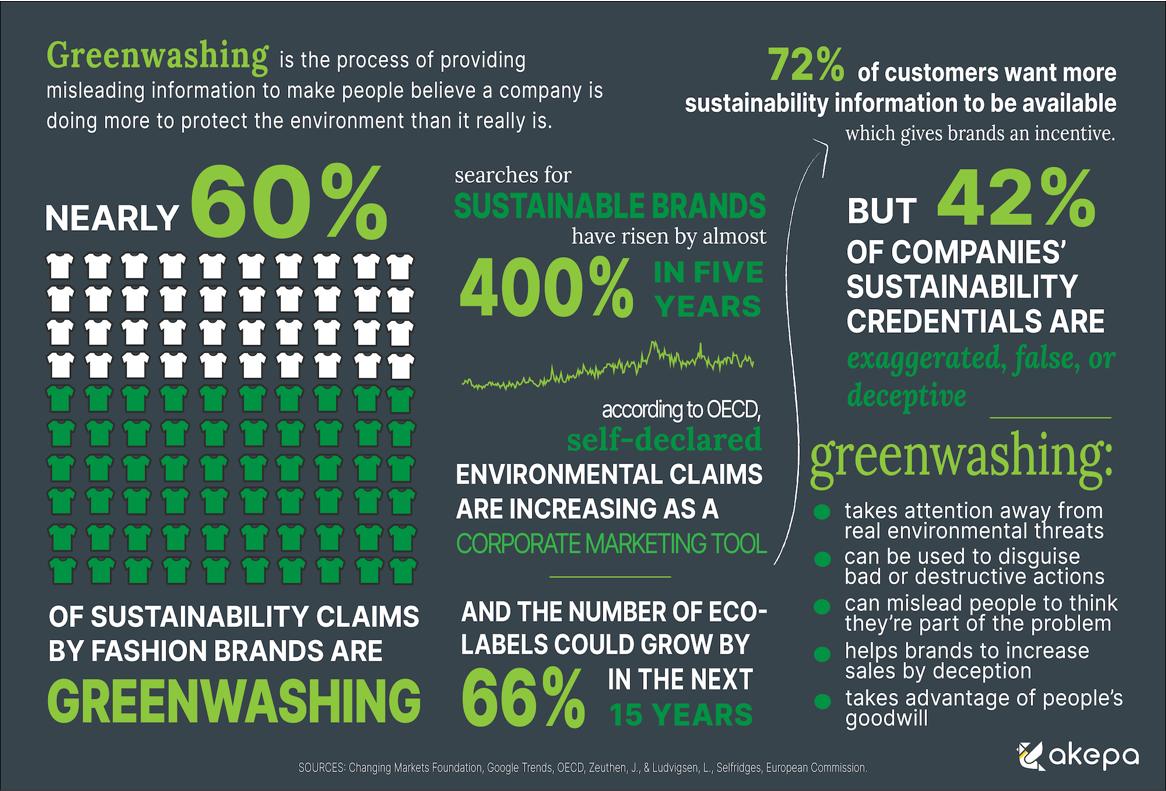Greenwashing versus transparency
What should be considered with "green" messages?
2023.2
![]()
Greenwashing - the targeted dissemination of disinformation in order to create an image of ecological responsibility - is widespread. Various PR instruments are skillfully used for this purpose.
Good greenwashing campaigns succeed in misleading stakeholders and giving them a positively distorted image of a company without explicitly telling the untruth.
In addition to alibi cooperation with environmental organizations or the founding of bogus initiatives, responsibility reports and so-called "hope stories" - such as how genetically modified maize stops hunger in the Third World - are published.
By means of "deep greenwashing", many companies also pursue long-term goals, such as enforcing self-regulatory mechanisms in environmental policy! Even though this rarely succeeds, it delays important legislative decisions.
“Green influencers” are also used specifically for "green storytelling". Well-known "green" bloggers or Instagram stars promote seemingly sustainable products in social media.
![]()
What is the problem?
Various studies prove the problematic nature of "green" claims. An omnibus survey conducted by gfs-zurich on behalf of Greenpeace revealed that over a third of respondents do not consider "green advertising claims" to be credible. 80% are of the opinion that "green claims must be substantiated.
New political framework in the EU
Europe's overarching political goal is the continent's climate neutrality by 2050. The Green Deal sets out the measures to achieve this goal. To achieve this goal, consumers should make climate-optimised purchasing decisions without being misled by greenwashing. Responsible companies should be able to clearly differentiate themselves thanks to credible communication.
Planned guidelines concerning greenwashing
The draft Greenwashing Directive was published at the end of March 2023 and is now out for consultation. It contains specifications on how advertising terms in connection with ecological product characteristics are to be handled. For example, sustainability labels that are not based on a certification system are to be prohibited in the future and environmental claims (such as "30% less", "better than", etc.) must be able to be substantiated with recognized figures at any time.
Initiatives in Swiss politics
On 14.3.2023, a postulate on "Environmental claims in advertising. Analysis of their basis for clearer regulations" as well as a motion "Development of guidelines to combat greenwashing" were submitted. In addition, the existing Federal Law against Unfair Competition (UWG) applies, i.e., the principle of truthfulness as well as the prohibition of misleading and deceptive advertising.
All political initiatives pursue the same goal: claims should not be misleading, but justified and verifiable.
What can be done against greenwashing?
Greenwashing can be avoided with transparent and fact-based communication. The prerequisite is a credible and sustainable communication strategy that takes into account all stakeholder relationships and builds trust.
![]()
From a communication point of view, I am convinced that in the future, companies will be judged much more by the responsibility they assume towards their stakeholders and how credibly they communicate their actions.
What should be considered with "green" messages?
2023.2

Greenwashing - the targeted dissemination of disinformation in order to create an image of ecological responsibility - is widespread. Various PR instruments are skillfully used for this purpose.
Good greenwashing campaigns succeed in misleading stakeholders and giving them a positively distorted image of a company without explicitly telling the untruth.
In addition to alibi cooperation with environmental organizations or the founding of bogus initiatives, responsibility reports and so-called "hope stories" - such as how genetically modified maize stops hunger in the Third World - are published.
By means of "deep greenwashing", many companies also pursue long-term goals, such as enforcing self-regulatory mechanisms in environmental policy! Even though this rarely succeeds, it delays important legislative decisions.
“Green influencers” are also used specifically for "green storytelling". Well-known "green" bloggers or Instagram stars promote seemingly sustainable products in social media.

What is the problem?
Various studies prove the problematic nature of "green" claims. An omnibus survey conducted by gfs-zurich on behalf of Greenpeace revealed that over a third of respondents do not consider "green advertising claims" to be credible. 80% are of the opinion that "green claims must be substantiated.
New political framework in the EU
Europe's overarching political goal is the continent's climate neutrality by 2050. The Green Deal sets out the measures to achieve this goal. To achieve this goal, consumers should make climate-optimised purchasing decisions without being misled by greenwashing. Responsible companies should be able to clearly differentiate themselves thanks to credible communication.
Planned guidelines concerning greenwashing
The draft Greenwashing Directive was published at the end of March 2023 and is now out for consultation. It contains specifications on how advertising terms in connection with ecological product characteristics are to be handled. For example, sustainability labels that are not based on a certification system are to be prohibited in the future and environmental claims (such as "30% less", "better than", etc.) must be able to be substantiated with recognized figures at any time.
Initiatives in Swiss politics
On 14.3.2023, a postulate on "Environmental claims in advertising. Analysis of their basis for clearer regulations" as well as a motion "Development of guidelines to combat greenwashing" were submitted. In addition, the existing Federal Law against Unfair Competition (UWG) applies, i.e., the principle of truthfulness as well as the prohibition of misleading and deceptive advertising.
All political initiatives pursue the same goal: claims should not be misleading, but justified and verifiable.
What can be done against greenwashing?
Greenwashing can be avoided with transparent and fact-based communication. The prerequisite is a credible and sustainable communication strategy that takes into account all stakeholder relationships and builds trust.

From a communication point of view, I am convinced that in the future, companies will be judged much more by the responsibility they assume towards their stakeholders and how credibly they communicate their actions.
© 2023 Merlo Communications GmbH. All rights reserved.